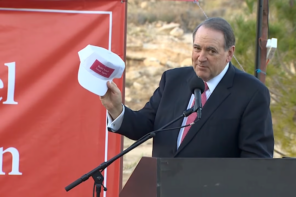The following is part of RD and PRA’s special coverage of the Pray Vote Stand Summit. All posts can be found here. – eds
9/16/2022 Morning
Attendance is down a bit this morning at Family Research Council’s Pray Vote Stand Summit. When Tony Perkins asks the crowd who attends First Baptist Church as a regular parishioner, approximately half of the attendees raise their hand. Compared to attendance at previous iterations of the FRC Summit in DC, less than 200 out-of-town attendees feels paltry. Next year’s summit is already planned for DC.
George Barna, senior research fellow at the FRC, announces in his opening speech that America is in crisis due to the scourge of “syncretism.” According to Barna, there are several worldviews in America through which people interpret the world and their lives. The only correct worldview is of course a biblical worldview, built on the typical Christian Right talking points: God is all-knowing and all-powerful, absolute moral truth exists, humans are sinful by nature, the Bible is literally true and written by God, and God created only two genders meant to love each other in marriage. Unfortunately, a majority of Americans practice “syncretism” by taking pieces of different worldviews to create their own personal worldview. Barna considers this an “evil” practice that causes individuals and the nation to fall into disarray.
(Of course a person would only see American evangelicalism as itself being syncretic if they believed that capitalism and Christianity were distinct worldviews.)
Barna’s questionable methodology has “revealed” a shameful statistic for the Christian Right: while 50% of Americans claim to have a biblical worldview, “only 6% actually do.” In Barna’s words, “when somebody doesn’t embrace a biblically-based worldview, they’ll embrace a world-based worldview. And that will lead them astray.” (One can only surmise that a “world-based worldview” must be a very bad thing.) By asking survey respondents whether they have a biblical worldview, then independently determining whether each respondent acts sufficiently to support that worldview, Barna is granting himself ultimate authority to determine who is and who isn’t a true evangelical Christian—thus who has and hasn’t strayed from God.
Worse, Barna’s research also “reveals” that even 60% of Christian pastors don’t have a biblical worldview—a problem for conservative Christians trying to pass on their absolutist and bigoted values to new generations. Barna wonders: if schools, the government, and even pastors won’t impart a biblical worldview onto children, how will their personal salvation, and the salvation of the US, be achieved?
Thankfully, Barna has a solution: renew churches so that their internal systems and community involvement align with a biblical worldview. Then, relying on those pastors and parents (as well as grandparents) with a truly Biblical worldview, evangelize every child possible. Barna closes by encouraging the audience to proselytize to nieces, nephews, grandchildren, neighbor’s children, and any other kid they might come into contact with. In his words, “it doesn’t matter who the children are. Recognize you can disciple them.”
Biblical worldview
Barna then sits down with Tony Perkins and Marc Nuttle, a longtime evangelical political strategist, to expand upon the importance of a biblical worldview. Tony remarks that promoting and spreading biblical worldviews is of utmost importance. Indeed, that is the objective of Pray Vote Stand.
Rather than political issues or individual leaders, Americans are driven by their own happiness—but also by their families, which is God’s intention according to Barna. The family is God’s creative order. The biblical worldview is how God designed our lives.
The importance of the family in God’s plan is precisely why communism’s first order is to remove and destroy God’s family, according to Nuttle. Homosexual and transgender ideology are the satanic forces seeking to undermine the family unit. Abortion destroys God’s creation. Any truth other than that of the Bible is, well, wrong.
Fortunately, Barna exclaims, half of the values of Colonial America are still in place today—meaning the bedrock of America hasn’t changed—so there’s hope that people can still be united within these values. What Colonial values is Barna is referring to? He doesn’t say. But, America’s founding is worth celebrating without any attention to slavery and colonialism.
And, yet, Barna laments how pastors around the country are softening on God’s word, and we need to return to God’s word. Perkins follows up explaining how the term “evangelical” has become almost meaningless, with only 51% of evangelical pastors having a biblical worldview. He implores the audience to commit to being a “SAGECON” or ‘spiritually-active, government-engaged conservative.” According to Barna, SAGECONs are 9% of the American adult population, but had a 99% turnout in the 2020 elections, making them 14% of voters and 30% of Trump’s base. Again, how this was measured is unclear, but Perkins is quick to have the audience take the SAGECON survey available on FRC’s website.
Just another convenient way to categorize and create order.
FRC’s Matt Carpenter leads the next panel on Faith, Politics, and Hispanic Realignment, with two Trump strategists and the president of the Latino Coalition for Israel. The panel takes a stronger rhetorical hardline than yesterday. Carpenter sets the tone immediately, asking the Latino Coalition’s Mario Bramnik how he thinks Latinx peoples’ experiences with “authoritarian socialist and communist regimes” in Central and South America inform their participation in US politics. This implication informs the whole of the panel: that Latinx people are all migrants whose worldviews, if you will, are shaped by their lives in other countries.
The panelists also agree that Latinx people are inherently conservative. Bramnik chides, “you don’t indoctrinate our children with transgender ideology in a Hispanic home.” “And don’t call us ‘Latinx’,” adds Adianís Morales, former director of Latinos for Trump. “It’s a term that erases males and females.” According to Morales, Latinx people are migrants, they’re a conservative voting bloc, and their reading comprehension is poor: “We’re from countries called democráticos, so when we see “Democrat” on the ballot, we vote for it.”
Along the way, panelists sample liberally from Christian nationalist and conspiracy rhetoric. “America is a Judeo-Christian nation,” thunders Bramnick, “and everywhere I go, I decree that the time of the globalist Antichrist nation is not yet!” (the irony of the Judeo half of his description and the antisemitic undertones of “globalist Antichrist” is clearly lost on him).
“We’re supposed to subdue the earth and take dominion of our territory,” Morales tells the audience with a nod to dominionist ideology, which charges followers to take control of government, media, education and other spheres of societal influence in order to engineer a Christian theocracy in the U.S.
The audience applauds Morales’ proclamation, a response which suggests that dominionist ideology is widely, if quietly, accepted among conference attendees. Railing against social media with a fervent conspiratorial tone, Morales warns that “when your child touches the screen on TikTok it follows everything…this is part of the globalist agenda, not only of indoctrination, but of taking over America and the world.”
The rhetoric heightens further. Steve Cortes, a former strategist and spokesperson for Trump’s 2016 and 2020 campaigns, asks if we saw Biden’s “Red Sermon” last week, calling it “demonic and demonized. [The speech] castigated tens of millions of Americans.” Hispanics, Cortes explains, are naturally attracted to the “culturally conservative, economic populist, nationalist” politics of today’s GOP, and cites J.D. Vance, Blake Masters, Kari Lake and Diego Morales as praiseworthy GOP candidates in the upcoming midterm elections (despite the supposedly nonpartisan nature of the Pray Vote Stand summit). Panelists encourage the audience to “connect with local Hispanic communities and their churches,” and to celebrate that “we are consolidating the Hispanic conservative movement—whether Anglos or African Americans, we need to unite. God is in the unity. We need to enlarge the tent.”
Meanwhile, the true extent of the much-touted shift rightward among Latinx communities in the U.S. remains unclear. While some precinct-level analysis suggests that, compared with his performance in 2016, Trump made gains among Latinx voters in 2020 in places like South Texas, some surveys have suggested that solid majorities continue to support Democrats. It remains to be seen whether predictions, from Cortes and others, of a Hispanic realignment into a big-tent, populist GOP will bear fruit, and how these proclamations square with the Right’s fervent anti-immigrant xenophobia.
The morning’s last panel returns to a familiar conference theme, attacking public education and charging Christian conservatives to “retake” American schools. “Public schools are being used as a vehicle by the Left,” warns Perkins, “to indoctrinate our children with our tax dollars.”
Amy Cawvey, a school board member in Lansing, Kansas, outlines her journey as a mother of three and active parent volunteer who decided to run for school board in fall 2020, outraged by “masking, CRT policies, gender ideology” and other decisions by her local school board. Cawvey and two other conservatives “ran on our values as conservatives, and we won…[and] now we have a majority.” With the imprimatur of the majority, Cawvey and her fellow school board members repealed their school district’s mask mandate, shut down a school “social justice club,” removed books from the school library, and forbade teachers from protecting trans students from nonaffirming parents.
Meg Kilgannon, Senior Fellow for Education Studies at the FRC, explains that because the Left supposedly controls national educational institutions, conservatives must focus on local activism. “Queer theory radicals are running the Department of Education now,” Kilgannon claims, likening the US to North Korea. “They believe there is no truth. Their worldview is not our worldview…When you get people involved in the local level, you can push back against these policies.”
Kilgannon warned that the Office of Civil Rights has “politicized school disciplinary procedures,” making it a “hate crime to discipline a student for misbehavior if a student has a particular skin color or ethnic identity.” She called this “an attack on order, on discipline, on our ability to judge right from wrong, social from anti-social behavior. Our children need order to learn.” Not only is this narrative false—it highlights the Right’s fixation on authoritarian, punitive models of discipline and control, an impulse they seek to enact in family life, in schools, in government and across the social fabric.
The FRC offers a “school board boot camp” to members and parishioners hoping to get involved at the local level. Cawvey’s own campaign was supported by the 1776 Project PAC, which also supported successful school board candidates in Florida. The PAC, like Trump’s 1776 Project, is styled as a response to the 1619 Project, developed by journalist Nikole Hannah-Jones with the New York Times Magazine.
Martin Strother, Education Director at Indiana Family Institute, explains how he applies lessons from Cawvey’s win in Kansas in order to offer advice for other conservative Christians to influence school boards. “Some are called to run for school board,” he explains, “and some are called to be a team of support for those candidates. Build relationships with good teachers and administrators. Go to school board meetings…We can’t continue to concede massive institutions that we know are corrupt and controlled by leftist unions.”
Reach out to us on Twitter or Instagram @PRAEyesRight with any questions or comments about the summit. Read more here.





